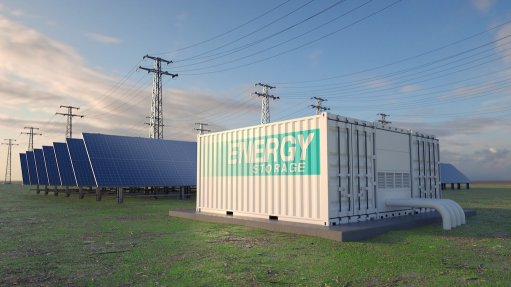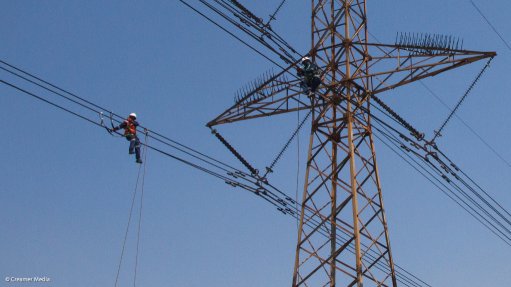Policy: Crucial to SA’s energy transition and socio-economic stability
This article has been supplied.
By Shirley Webber, Coverage Head Resources and Energy at Absa
The transition to renewable energy is critical for South Africa's future. By creating a favourable policy environment that supports and incentivises investment in green energy, we can accelerate the country’s transition and drive positive outcomes for its people, writes Shirley Webber, Coverage Head Resources and Energy at Absa.
At a time when, South Africa’s grid is performing poorly due to years of underinvestment, its people are the ones who are feeling the real impact. So far, loadshedding has cost the economy as much as R1.2 trillion, according to advocate Tembeka Ngcukaitobi, who is representing political parties against Eskom. The knock-on effects are taking a serious toll on employment, food security and community stability.
To reduce the impact and contribute to safe and sustainable socioeconomic outcomes, private investment in renewable energy projects has grown, following regulatory reforms and escalating loadshedding.
With the government’s decision to remove licensing requirements for generation projects, irrespective of their size or capacity, interest in green energy solutions has soared.
In the first quarter of 2023 alone, private companies have already registered nearly 2 500MW of renewable energy projects, which amounts to as much as two stages of load shedding. As we continue to see the growth and potential of the renewable-energy sector, the numbers speak for themselves.
In March of this year, a total of 31 renewable energy projects, amounting to 1 308MW of collective capacity, were registered and approved by the National Energy Regulator of South Africa (NERSA). This is a notable increase of more than 800%, compared to 2021, when 134 projects registered in the entire year.
Further data from NERSA indicates that seven wind projects account for the bulk of new capacity, totalling 1,058.2MW. Additionally, there is one co-generation project registered by Illovo South Africa in KwaZulu-Natal, which combines solar and wind and has a capacity of 24.7MW.
Sugar company Illovo has long taken a proactive approach to its own energy needs. The company reports that it produces 90% of its own power, through biomass projects using bagasse, a sugar by-product. In eSwatini, Illovo says its biomass plants generate around 165-gigawatt hours (GWh) of electricity annually, and are able to supply around 60GWh to the country’s grid.
The South African government has also announced plans to procure up to 10 000MW of additional energy in bid windows 7 and 8 of the Renewable Energy Independent Power Producer Procurement Programme (REIPPP).
This shows that regulatory reform to reduce the impact of load shedding, has helped unlock the potential of the renewable energy sector, with the massive surge in private investment.
Investing for the future
While we’re on the right track, more work needs to be done by both government and the private sector to develop a policy environment that reduces load shedding, promotes energy security by driving interest in renewable projects, and ultimately protects the social and economic interests of South Africans.
For instance, government should consider more progressive regulatory reforms for renewable energy. This includes creating incentives for private investment, such as more attractive tax rebates or feed-in tariffs, which can help to drive innovation, reduce the costs of green energy and put more income in the pockets of those investing in the country’s renewable infrastructure.
We need to recognise the need for a diverse energy mix and proactively invest in modernising our grid infrastructure to ensure it is capable of efficiently managing various green energy sources.
What’s more, work can be done to encourage the development of local renewable energy industries by providing training and support for local businesses – ensuring they can grow from concept phase to commercial viability.
This can help to create jobs and promote economic growth in the clean energy sector, which can have positive ripple effects throughout the economy.
Beyond this, private events like Mining Indaba and Green Energy Africa (GEA) can help to drive positive socioeconomic outcomes for Africa and its people.
The GEA 2023 Energy Investment Village (EIV), for instance, creates opportunities for growth for clean-tech start-ups and energy projects. The initiative is open to start-ups in the early stages of rolling out clean-tech projects, as well as large-scale energy projects of between 20 and 100MW, requiring finance to get off the ground.
In its second year, the EIV is a partnership between Saldanha Bay Innovation Campus and Research Institution for Innovation and Sustainability (RIIS), supported by Anza Capital and Afida. Last year's event saw finalists representing local clean-tech projects pitching to energy leaders holding potential investments worth more than $100 billion.
The event was won by Brayfoil Technologies, a South African wind-energy company whose adaptive turbine designs enable more efficient applications in the wind energy, aerospace, sailing and automotive sectors. Following the win, the Brayfoil team hosted several meetings with potential investors on the sidelines of the GEA.
The EIV is an exciting innovation pipeline at a time of global energy crisis, with bottlenecks in international power supply, geopolitical uncertainty and a rapidly evolving energy mix.
By supporting clean-tech and green initiatives, we can help upscale them, enabling them to contribute more energy to the grid and reduce reliance on fossil fuels.
Growing the energy industry
As we look towards a more sustainable future, investment in the renewable energy sector won’t just play a critical role in ensuring a secure and reliable energy supply, it will also support socio-economic stability by providing new job opportunities, stimulating economic development and reducing carbon emissions.
But this is only attainable with the continued support of both government and the private sector to cultivate a favourable policy environment that supports the growth of the renewables industry.
Progressive partnerships can ensure the renewable energy transition continues to accelerate, and supports a more stable, sustainable green energy future and zero-carbon world.
Absa’s experience and innovative solutions in the renewable space can assist in enabling the just transition in Africa to succeed. When all stakeholders work together, this becomes a win-win situation for all, leading to the successful growth of the whole continent.
Comments
Press Office
Announcements
What's On
Subscribe to improve your user experience...
Option 1 (equivalent of R125 a month):
Receive a weekly copy of Creamer Media's Engineering News & Mining Weekly magazine
(print copy for those in South Africa and e-magazine for those outside of South Africa)
Receive daily email newsletters
Access to full search results
Access archive of magazine back copies
Access to Projects in Progress
Access to ONE Research Report of your choice in PDF format
Option 2 (equivalent of R375 a month):
All benefits from Option 1
PLUS
Access to Creamer Media's Research Channel Africa for ALL Research Reports, in PDF format, on various industrial and mining sectors
including Electricity; Water; Energy Transition; Hydrogen; Roads, Rail and Ports; Coal; Gold; Platinum; Battery Metals; etc.
Already a subscriber?
Forgotten your password?
Receive weekly copy of Creamer Media's Engineering News & Mining Weekly magazine (print copy for those in South Africa and e-magazine for those outside of South Africa)
➕
Recieve daily email newsletters
➕
Access to full search results
➕
Access archive of magazine back copies
➕
Access to Projects in Progress
➕
Access to ONE Research Report of your choice in PDF format
RESEARCH CHANNEL AFRICA
R4500 (equivalent of R375 a month)
SUBSCRIBEAll benefits from Option 1
➕
Access to Creamer Media's Research Channel Africa for ALL Research Reports on various industrial and mining sectors, in PDF format, including on:
Electricity
➕
Water
➕
Energy Transition
➕
Hydrogen
➕
Roads, Rail and Ports
➕
Coal
➕
Gold
➕
Platinum
➕
Battery Metals
➕
etc.
Receive all benefits from Option 1 or Option 2 delivered to numerous people at your company
➕
Multiple User names and Passwords for simultaneous log-ins
➕
Intranet integration access to all in your organisation




















